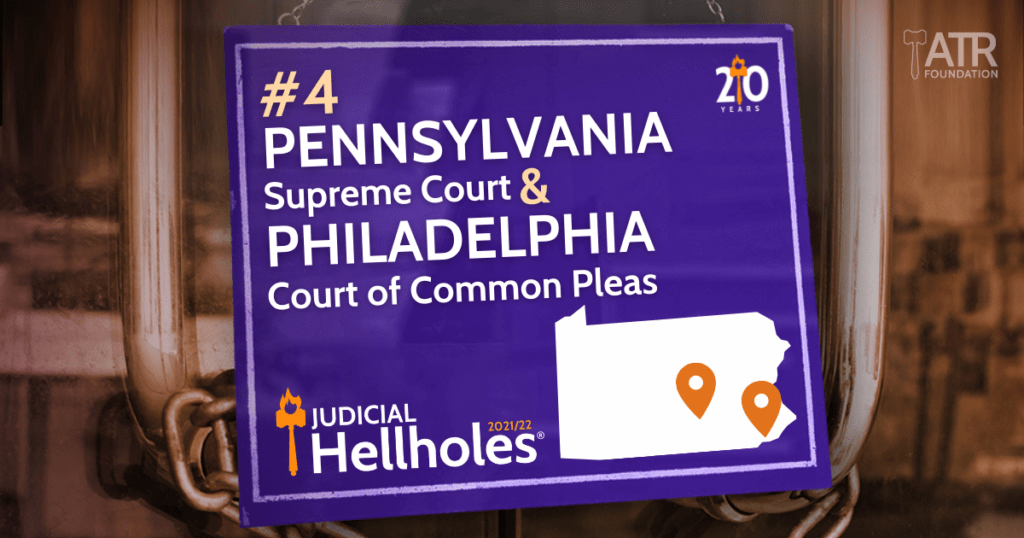‘Highly Unusual’ Rehearing of Louisiana Case Raises Judicial Independence Concerns
Louisiana Supreme Court Waffles Under Political Pressure, ATRA Brief Urges Court to Stand Strong

Problems include mass tort litigation and out-of-state lawsuits
Philadelphia’s Court of Common Pleas and the Supreme Court of Pennsylvaniatogether comprise the fourth worst “Judicial Hellhole®” in the country, according to a new report.
The American Tort Reform Foundation (ATRF), in its 20th anniversary edition of the annual report, says the courts’ continuous expansion of liability and the large amount of mass torts litigation in Philadelphia are to blame.
This marks the ninth year jurisdictions in Pennsylvania have been named Judicial Hellholes® – the state was also named an “Everlasting Judicial Hellhole” this summer.
“Philadelphia is known far and wide among trial lawyers as the premier destination for mass torts litigation, especially against pharmaceutical and medical device manufacturers,” American Tort Reform Association President Tiger Joyce said.
ATRF reports that there are more than 7,500 pending cases against a single pharmaceutical product, Risperdal, in the Philadelphia Court of Common Pleas Complex Litigation Center alone. As of 2019, 85% of pharmaceutical cases in Philadelphia’s Complex Litigation Center were from outside the state.
“Pennsylvania judges tend to swing the courtroom doors open to out-of-state plaintiffs and their lawyers,” Joyce said. “They’re also made a habit of ignoring the U.S. Supreme Court’s precedent regarding personal jurisdiction, so it’s likely that there will be an uptick in out-of-state pharmaceutical lawsuits coming to Pennsylvania’s courts due to these recent decisions.”
In May, the U.S. Supreme Court announced it would not review a $70 million verdict involving Risperdal that came out of the Philadelphia Court of Common Pleas.
“State reforms to rein in activist judges are more critical than ever,” Joyce said. “The U.S. Supreme Court cannot be relied upon to police state courts, and these high-dollar, nuclear verdicts are more common than ever.”
Through the first half of 2021, trial lawyers spent $9.4 million on more than 71,000 local legal services advertisements in Philadelphia alone, the ATRF report states.
“Advertising is just another tool in the trial bar’s toolbox,” Joyce said. “They use advertisements to drive up the number of claimants, simultaneously increasing the pressure on defendants to settle.”
Recent rulings out of the Pennsylvania courts may make the situation even more dire, according to the ATRF. In February, the Pennsylvania Supreme Court held that a plaintiff doesn’t need to prove that a business was fraudulent or negligent in its representation to the plaintiff to succeed on an Unfair Trade Practices and Consumer Protection Law claim.
“By removing the requirement of fraud or negligence, the court removed any requirement that a business intended to mislead the consumer,” Joyce said. “In doing so, the court is all but opening the floodgates to an explosion of litigation by consumers with nothing more than buyers’ remorse.”
The Supreme Court of Pennsylvania’s 2020 Roverano decision also weakened the state’s Fair Share Act, which helps to ensure parties pay only their “fair share” of liability. Now, the lower courts are chipping away at comparative fault.
“Utilizing comparative fault in trials helps ensure fairness when it comes to determining fault and allocating damages,” Joyce said. “A recent Pennsylvania Superior Court ruling would effectively gut the state’s Fair Share Act. If the state backslides on this, Pennsylvania could go back to the days when small businesses were often compelled to settle frivolous lawsuits to avoid the threat of joint and several liability – the state Supreme Court must protect the Fair Share Act.”
The Roverano decision specifically impacted the application of the Fair Share Act in asbestos litigation. Philadelphia is the fourth most popular jurisdiction for asbestos lawsuit filings, and ATRF says the ruling could increase asbestos litigation in the future.
Pennsylvania is also one of the few states in the country lacking COVID-19 liability protections for frontline workers and businesses after Governor Tom Wolf’s (D) veto of a COVID-19 liability protection bill.
“The state’s lower courts are adopting an expansive view of COVID-19 liability which is being shut down in other states,” Joyce said. “Now another covid liability protection bill has stalled in the legislature, showing a concerning lack of urgency on state lawmakers’ parts. We urge the legislature to act and protect businesses and health care providers across the state.”
ATRF says Pennsylvanians pay a “tort tax” of $1,115 per person and that if the state enacted certain tort reforms, residents and businesses would save more than $14 billion, supporting 150,594 additional jobs.
Philadelphia’s Court of Common Pleas and the Supreme Court of Pennsylvania are among eight Judicial Hellholes® named in the 2021-2022 report:
Judicial Hellholes® are deemed the most unjust local courts and state civil justice systems in the country. Read the full report at JudicialHellholes.org.
Louisiana Supreme Court Waffles Under Political Pressure, ATRA Brief Urges Court to Stand Strong
Left unchecked, these jurisdictions will continue dragging down economic growth and undermining justice through rampant lawsuit abuse.
Claimants Given Opportunity to Vote on Plan; Judge to Reconsider Scientific Validity of Plaintiffs’ Experts
Legitimate consumer protection demands sound science and impartial analysis — not distorted data designed to manufacture lawsuits.
Law Firms Spent $168M+ on 2.2M Ads in Georgia
ATRA’s Latest Studies Reveal Financial Influence and Lack of Transparency in Pennsylvania’s Campaign Finance Systems